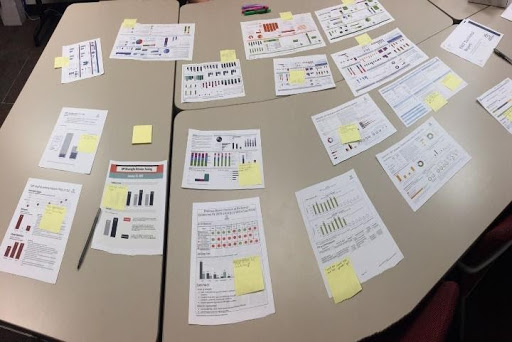Greetings from Los Angeles! My name is Rocele Estanislao and I have worked in the nonprofit and philanthropic sector for over 20 years in program evaluation and data management. I have also had the opportunity to use data visualization in various organizations as a way to shift organizational culture in using data and, at the same time, build rapport and trust. Below are five lessons I have learned of how to instill a data viz culture within an organization:
Lesson Learned #1:
Timing Matters
Sometimes you have to wait for the right opportunity and be ready for it. When I worked at a foundation, every year there was an annual board memo that was drafted giving an overview of the grantmaking priorities. This was a text-heavy, 8-page document and I was waiting for an opportunity to turn this into a dashboard. Well after a year, I had my opportunity. The vice president of programs asked me to create a dashboard of the grants data. This was the moment I was waiting for…changing a lengthy narrative memo into a dashboard.
Lesson Learned #2:
Start Small – One Dashboard at a Time
Sometimes it’s best to start with one program or project. Once I created the dashboard for the board memo, then I was asked to create a dashboard on program staff productivity. Originally, the staff productivity report was in a form of a memo with an embedded data table.
Lesson Learned #3:
Make the Process Fun and Interactive
Doing so, engages staff and other stakeholders. In one organization, I used flipchart paper and index cards to engage program staff in a program theory exercise. Program staff enjoyed this method so much that it sparked the idea of doing a life roadmap activity with youth in their after-school program.
Lesson Learned #4:
Be Intentional
Be aware of the message you or your organization want to convey. It’s not just about presenting data…it’s about humanizing the data because it essentially represents people and tells the story of an organization’s impact.
Lesson Learned #5:
Sustaining the Craft

One of the biggest challenges in sustaining a data viz culture is how to keep it going, especially when staff leave. One way to do so is having regular data viz peer learnings. It creates a space for staff to build their skillset while at the same time strengthening teamwork.
In my experiences, instilling a data viz culture has led to improved staff capacity by building skills, strengthening rapport, and engaging staff with their data. To learn more about creating a data viz culture, check out Stephanie Evergreen’s blog on Building a Culture of Effective Data Visualization (you might also see a picture of me too).
The American Evaluation Association is celebrating Data Visualization and Reporting (DVR) Week with our colleagues in the DVR Topical Interest Group. The contributions all this week to aea365 come from DVR TIG members. Do you have questions, concerns, kudos, or content to extend this aea365 contribution? Please add them in the comments section for this post on the aea365 webpage so that we may enrich our community of practice. Would you like to submit an aea365 Tip? Please send a note of interest to aea365@eval.org. aea365 is sponsored by the American Evaluation Association and provides a Tip-a-Day by and for evaluators. The views and opinions expressed on the AEA365 blog are solely those of the original authors and other contributors. These views and opinions do not necessarily represent those of the American Evaluation Association, and/or any/all contributors to this site.

Hi Rocele, Thank you for sharing your insights on building a data viz culture — something I’m striving to do in my work as well! You mentioned in Lesson Learned #3, an engaging process whereby “used flipchart paper and index cards to engage program staff in a program theory exercise. Program staff enjoyed this method so much that it sparked the idea of doing a life roadmap activity with youth in their after-school program.” Would it be possible to share additional details on these activities? I’m always looking for activities to engage partners, stakeholders, and youth in evaluation. Thank you!
Sure. I’ll email you so we can find time to chat.